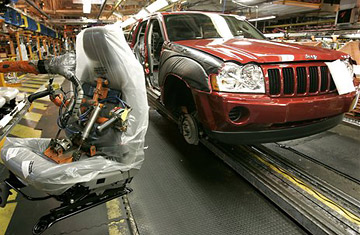
Cerberus LLC, the New York-based private-equity company that runs Chrysler is prepared to take what is described as a significant stake in any new auto company that may be created by merging General Motor and Chrysler. Many observers had concluded that Cerberus believed it had been burned after buying an 80.1% stake in the struggling No. 3 automaker in 2007. At one point, there was speculation that Cerberus was trying to find a way to unload its ownership in the car company. However, an executive familiar with the talks tells TIME that Cerberus is not preparing to walk away from its investment. "They're long term investors. They would want to keep a meaningful stake in the combined companies," said the executive. A merger, however, may also be the best way for Cerberus to make good of a bad situation.
Turmoil on Wall Street and Main Street has forced the two struggling auto titans to consider the kind of merger that might have been unthinkable only a year ago. In an email monday to Chrysler employees, the company's CEO Robert Nardelli confirmed that Chrysler was holding discussions with potential partners, including GM. "I can tell you that we have approached and have been approached by third parties who are interested in exploring future possibilities with Chrysler," said Nardelli.
Other than that, no one would officially confirm the parties involved in the negotiations. Tony Cervone, GM vice president of communications for North America, said GM was not going to comment on any discussion with Chrysler. "Without referencing this specific rumor, as we've often said, GM officials routinely discuss issues of mutual interest with other automakers," said Cervone. As for Cerberus, Tim Price, an executive with the company said, "I'm not going to comment on private business meetings." But Price added, "Look, everybody is talking to everybody else in the automobile industry."
The outlook is dire for both automakers. Chrysler, as a private company, doesn't release quarterly financial information but it has confirmed that it lost $1.9 billion in 2007. (The German corporation Daimler, which still owns 19.9% of Chrysler said the American carmaker lost $510 in the first quarter of 2008.) GM lost $15.5 billion in the second quarter and is expected to post additional losses when it reports its third quarter results at the end of October.
All the nerger talk has made labor suspicious. A spokesman for the UAW declined to comment on the merger but one told TIME neither company has approached the UAW. "No one has talked to us about it," said the official who asked not to be identified. "I don't see what we get out of it. We're both way too dependent on trucks and sport utility vehicles," noted the union official who represents Chrysler workers at a plant near Detroit. There are fears that a merger would simply be a way to reduce the workforce. Chrysler has eliminated 22,000 jobs since Feb. 2007, reducing its ranks by approximately 66,000 employees. The company also plans to eliminate another 4,000 jobs next year, making it half the size it was in 2001.
While a merger may make sense in terms of consolidating a troubled industry as a whole, it may not make financial sense given the specifics of GM's situation. While GM has insisted its current reserves of $21 billion can help it weather the economic turmoil and continue its restructuring efforts through 2009, that amount may not be enough to finance a post-merger restructuring of Chrysler. GM is also publicly committed to delivering the new electric Volt automobile before end of 2010 and closing Chrysler plants and technical centers to save cash could violate the spirit of $25 bilion in loan guarantees approved by Congress last month to help American carmakers rebuild — and which emphasized job creation and preservation in the industry.
Among industry analysts, there is also skepticism whether a merger would even work. "I just don't see the benefit to GM," notes an executive from a key supplier. "I can see the value in terms of reducing overlap and reducing capacity," says Laurie Harbour Felax, an analyst with the Harbour-Felax Group in Clarkston, Mi. "But the cost of doing that are so enormous, you have to wonder if it's really worth it," she says. Chrysler also has relatively few products that are not duplicates of those already sold by GM, she said.
There are other parties in the merger hunt. The French automaker Renault is also interested in Chrysler, according to several industry sources. But corporate merger would just be a step-up from the collaboration already going on among rivals in the industry. The sheer cost of developing new, more fuel-efficient vehicles is driving companies together, observes another executive, who notes that GM has already collaborated with Ford on building new transmission and has worked with Chrysler and BMW in developing hybrid vehicles. Chrysler spokeswoman Lori McTavish said that Chrysler entered into a partnership with Nissan earlier this year to build trucks for the Japanese automaker. Last month, the company began building minivans with Volkswagen North America. VW is already marketing the Chrysler-built minivans with slick new ad campaign featuring Brooke Shields.
Meanwhile, the outlook for the entire industry remains grim. Show rooms across the country are empty. Furthermore, in spite of Monday's huge upturn on Wall Street, GMAC, the finance company owned jointly by GM and Cerberus, did not loosen its strictures on credit, announcing it would not underwrite loans for any customer who did not have a credit score of at least 700, effectively shutting out the majority of buyers. Said GMAC spokeswoman Sue Mallino: "The company currently expects these actions to remain in place until the credit markets stabilize and accessibility improves."
